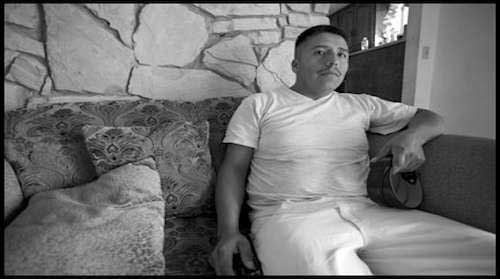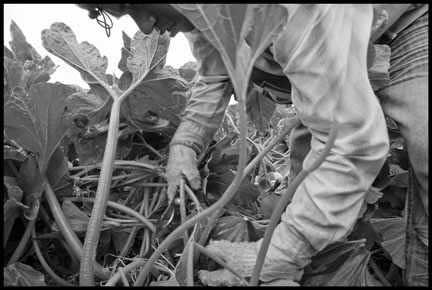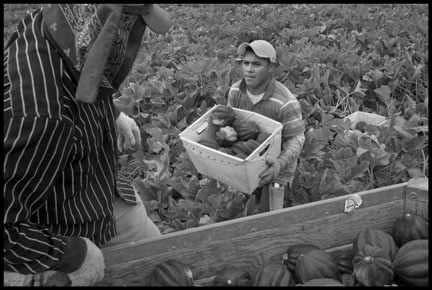
Support justice-driven, accurate and transparent news — make a quick donation to Truthout today!
Can you help sustain our work in 2014? Click here to make a tax-deductible contribution to Truthout!
As families celebrated Thanksgiving and Christmas, farmworkers across the country who help harvest the food that was prepared this holiday season continue to struggle under bitter working and living conditions. Jose Lopez comes from the Mixteco town of Jicayan de Tovar in Guerrero. He’s worked in the fields for 10 years, but makes so little that he has to borrow money to pay his bills, and has almost none left over to send to his family in Mexico. He told his story to New American Media associate editor David Bacon.
I’ve worked in the fields here for 10 years, always in Fresno. I come from Jicayan de Tovar in Guerrero, where we speak Mixteco and Spanish. There are a lot of people from my town working here in Fresno. Every year I pick eggplant, grapes, peaches and nectarines, and also grape leaves. I work pruning during part of the year as well. I get seven to eight months of work each year. Right now the pay is eight dollars an hour. Sometimes I get paid by the hour, and sometimes I work by the piece rate, but it comes out to about the same thing.
Picking grapes for raisins is the hardest job. It’s a lot of work and in hot conditions. Sometimes we work up to 11 or 12 hours a day, but they never pay us overtime pay. I get extremely tired after a day’s work, especially because of the heat. On this job, the pay is 25 cents per tabla [a bucket of grapes spread out over a piece of paper in the row between the vines]. I make approximately $300 a week on this job. Considering the long hours and the extreme heat, it is not a fair wage. It’s not enough.
 Fermin Garcia works in crew of farmworkers picks acorn squash in a field just outside of Fresno, in the San Joaquin Valley. (Photo: David Bacon)
Fermin Garcia works in crew of farmworkers picks acorn squash in a field just outside of Fresno, in the San Joaquin Valley. (Photo: David Bacon)
With this pay, I have to support three children, my wife and myself. My wife doesn’t work, because she has to take care of the children. Sometimes that $300 isn’t enough. I have to buy food and other things the children need and want, and it doesn’t cover all of it. If there is a lot of work I can save enough money while I’m working to last through the months when I don’t work. When I can’t find work, we use our savings. Then, when the money runs out, I have to ask for a loan and pay it back when I’m working again.
My oldest child is seven years old, the second is six and the youngest is six months. So two are in school, and for them I have to purchase school clothing and supplies. There are times when I don’t have enough money for that either. I have to ask for a loan and buy them what they need. There are times when I don’t have enough money for food, and I ask for a loan then also. If it wasn’t for that loan, I would not have a way to buy the family’s items.
It’s not right to work so hard, and not earn enough to support my family, but what can we do? We can’t get a better paying job. We can’t do anything else, that’s why we work in the fields. But the owners are earning enough aren’t they?
Some foremen treat us well, but others yell at workers and tell us to work faster. Some let us take our 15-minute breaks and others don’t. Workers suffer a lot while we’re working. If we don’t work hard, then we’re out of a job and can’t pay the rent. If we don’t work fast, we’re fired for that too. It’s the job we have. We feel bad when we’re yelled at. We feel humiliated — it’s not right to be treated in that way. I sometimes feel like saying something because there is no need to yell at workers. But if I were to say something I would be out of a job.
My friends have seen workers faint because of the heat and lack of water. Sometimes the pesticides on the vine are transferred to the workers too. We suffer the consequences of working around these chemicals, but we don’t know whom we can talk to about it.
 A worker gets ready to lift the box of squash he’s cut to the loader in a trailer. (Photo: David Bacon)
A worker gets ready to lift the box of squash he’s cut to the loader in a trailer. (Photo: David Bacon)
I’ve felt sick because of pesticides. Recently while I was pruning I began feeling very ill, with a headache and a lot of pain. I didn’t know what chemicals I’d been exposed to, but I couldn’t work. The little money I had earned working, I had to spend seeking medical care. When I went to see the doctor, he just told me that I could buy medicine. I was out of a job for a while, and I still feel sick from it. I’m also worried about the long-term effects.
Picking peaches can also cause problems. The dust from the fruit causes skin irritation. I’ve experienced that. It’s possible to avoid it, but the grower doesn’t provide gloves or long-sleeved shirts, so you buy your own or you pick peaches without protection. The peach season lasts one or two months, and for this work they pay eight dollars an hour – the same as for everything else. I don’t like picking peaches but I need the money, so I have to do it even though I would rather not.
I’m sending money back to my family in Guerrero. I don’t earn a lot, but I have to send at least something. That’s why I came to the United States, to send money back to my family in Mexico. I wanted to come here to work and earn money in order to help support them. There is work in Mexico, but the wages are too low. My family owns land in Jicayan de Tovar, but very little, not enough to support a family.
 Jose Lopez in the living room of his home in Caruthers. (Photo: David Bacon)
Jose Lopez in the living room of his home in Caruthers. (Photo: David Bacon)
I’ve heard of the American dream. Some think that everyone who comes here will have a better life. But there isn’t much money here. I thought I’d be earning more. We have to earn enough to pay the rent in this country and it is very high. The money we earn isn’t enough to support our families here and in Mexico both. I feel bad and frustrated that I can’t do anything about it.
Copyright by David Bacon.
Media that fights fascism
Truthout is funded almost entirely by readers — that’s why we can speak truth to power and cut against the mainstream narrative. But independent journalists at Truthout face mounting political repression under Trump.
We rely on your support to survive McCarthyist censorship. Please make a tax-deductible one-time or monthly donation.